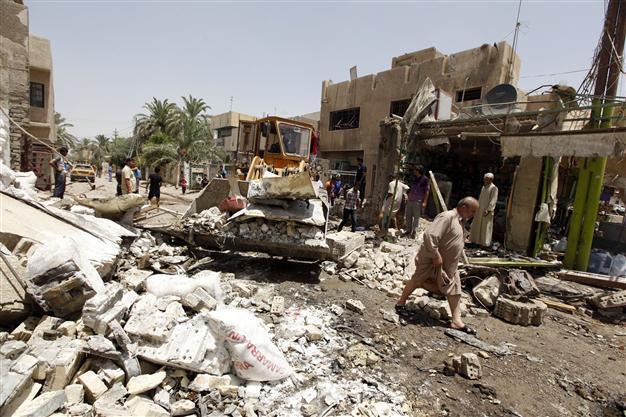String of bombings kill 13 in Iraq market
BAQUBA, Iraq - Agence France-Presse

This file photo shows people inspect the scene of a car bomb attack in Baghdad June 8, 2013. Two near-simultaneous car bombs and a suicide attack killed 12 people in a wholesale market north of Baghdad on June 10. REUTERS/Thaier al-Sudani
Two near-simultaneous car bombs and a suicide attack killed 13 people in a wholesale market north of Baghdad on Monday, the latest in a surge in violence that authorities have struggled to control.The blasts, which left another 53 people wounded, struck a predominantly Shiite town as fruit and vegetable stall owners were crowding the market, purchasing goods for the day's trading, a police officer and a medic said.
No group immediately claimed responsibility for the attacks, but Sunni militants linked to Al-Qaeda often target Shiite Muslims, whom they regard as apostates, in simultaneous and mass-casualty bombings.
The latest attacks were carried out in the town of Judaida al-Shat, which lies just west of Baquba, capital of Diyala province and one of the most violent areas in the country.
The unrest comes amid a surge in attacks in Iraq, with violence in May pushing the month's death toll to the highest such figure since 2008, raising concerns of a revival of the all-out sectarian war that blighted the country in 2006 and 2007.
There has been a heightened level of attacks since the beginning of the year, coinciding with rising discontent among the Sunni Arab minority that erupted into protests in late December.
Analysts say the failure of the Shiite-led authorities to address underlying frustrations among the Sunni community has given fuel and room for militants to increase their activities.
The UN envoy to Iraq Martin Kobler has warned that the violence is "ready to explode".
In a bid to ease tensions, Prime Minister Nuri al-Maliki has in recent days met with two of his arch rivals -- the Sunni speaker of parliament and the president of the autonomous Kurdish region.
While the country's top politicians have pledged to address persistent political disputes, which analysts say are linked to violence levels, no tangible moves have yet been announced.
















